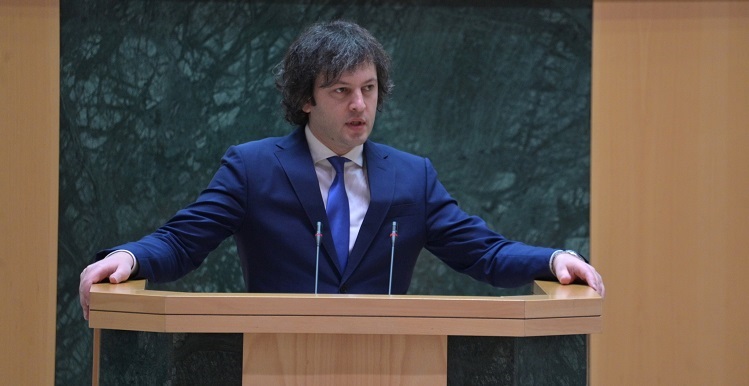PM candidate hails Georgia’s progress under current Gov’t, slams predecessor’s “treacherous”, anti-western” policies

Speaking about future plans, Kobakhidze stressed his Government would take actions for the country’s further EU integration. Photo: Parliament press office
Irakli Kobakhidze, the candidate for the post of Prime Minister of Georgia, on Thursday hailed the Georgian Dream Government's efforts for ensuring the country’s “democratic transformation” since taking office in 2012, while slamming the previous United National Movement authorities for committing “systemic crimes”, “stalling” Tbilisi’s European integration, and involvement in a “treacherous handover” of territories to Russia following the 2008 war.
In his Parliamentary address before the vote on the new Government and its programme, the official also credited Bidzina Ivanishvili, the former PM, GD founder and current Honorary Chair of the party, as well as outgoing PM Irakli Garibashvili, for their roles for the country’s “political, economic, and EU integration progress”.
In his remarks, Kobakhidze pointed to a “dire state of affairs” in Georgia prior to 2012, where he said a landscape “devoid of democracy, where human dignity and fundamental rights were routinely trampled upon” had taken hold.
Elections were marred by widespread fraud, while corruption among the so-called elite permeated every level of society. The judiciary, the Prosecutor's Office and law enforcement agencies were weaponised to serve the interests of the repressive regime”.
He also said the “zero tolerance policy”, declared by the UNM authorities towards convicted criminals, had led to “overflowing” prisons, with “countless young lives lost to violence on the streets”.
Torture and inhumane treatment were rampant, both within prisons and beyond. Media outlets were hijacked and monopolised, while dissenting voices within the intelligentsia were systematically silenced. Social progress, particularly towards Western integration, was deliberately stymied”, Kobakhidze alleged.
“Above all, we remember the gravest transgression of the former Government - the betrayal of 2008, when Abkhazia and Tskhinvali (South Ossetia) regions were relinquished to Russia, and the regime shamefully acquiesced to a European Council resolution falsely implicating Georgia in initiating military actions [to start the war]”.
This pattern of systematic wrongdoing and authoritarian rule came to an end in 2012 under the leadership of Ivanishvili. Known to Georgian society for his unprecedented philanthropic efforts aimed at revitalising Georgian culture and safeguarding our national identity, Ivanishvili steered the country towards a new era”, he told MPs.
Kobakhidze said Ivanishvili had also steered the country's economic policy “onto the right path”, leading to the domestic economy increasing from ₾27 billion ($10 bln) to ₾80 ($30 bln) “despite facing two global and regional economic crises” post-2012, with the combined budget rising from ₾8.5 billion ($3.1 bln) to ₾28.7 ($11 bln).
He also said the country had achieved “unprecedented” strides towards European integration since 2012, through signing the 2014 Association Agreement and the Deep and Comprehensive Free Trade Area deal with the EU, securing visa-free travel with European states and attaining the candidate status for EU membership last year.
Extending his gratitude to Garibashvili, Kobakhidze said the former’s latest, three-year term had been “very successful” amidst “challenging circumstances”, which he said included navigating through a global pandemic, addressing “artificial political crises” within Georgia, and managing the complexities surrounding the war in Ukraine and its implications on security and the economy.
It is important to recognise Garibashvili’s significant contributions. His tenure as PM saw Georgia successfully maintain peace and stability, despite formidable challenges. Under his leadership, Georgia's nominal economy nearly doubled in dollar terms over the past three years, and the country attained candidacy for EU membership”, he said.
Speaking about future plans, Kobakhidze stressed his Government would take actions for the country’s further EU integration, while highlighting “maintenance of national dignity” on the path.
He highlighted “one of the most important” tasks of the Georgian Government's foreign policy was to resolve the Russia-Georgia conflict and peacefully restore the country’s territorial integrity.
He also stressed “everything should be done to strengthen the Georgian society, its social structure, to promote the formation of a healthy civil society, not artificial pseudo-elites”, and claimed intolerance to “any form of corruption”.
While noting the principle of secularism, Kobakhidze stressed the Government was committed to bolstering “one of the vital pillars of our national identity - the Orthodox Church of Georgia - and safeguarding it against any threats stemming from neo-Bolshevik ideology”.
Kobakhidze also said the Government was unlikely to sign agreements similar to the one brokered by the European Council President Charles Michel in 2021 to resolve a months-long domestic political standoff between the ruling power and opposition after the 2020 parliamentary elections.
He stressed the Government would “never again sign such an agreement, which sought to lead the country outside the bounds of the constitutional framework”, and added it would reject “any future mediation or involvement from external parties in such matters”.
 Tweet
Tweet  Share
Share